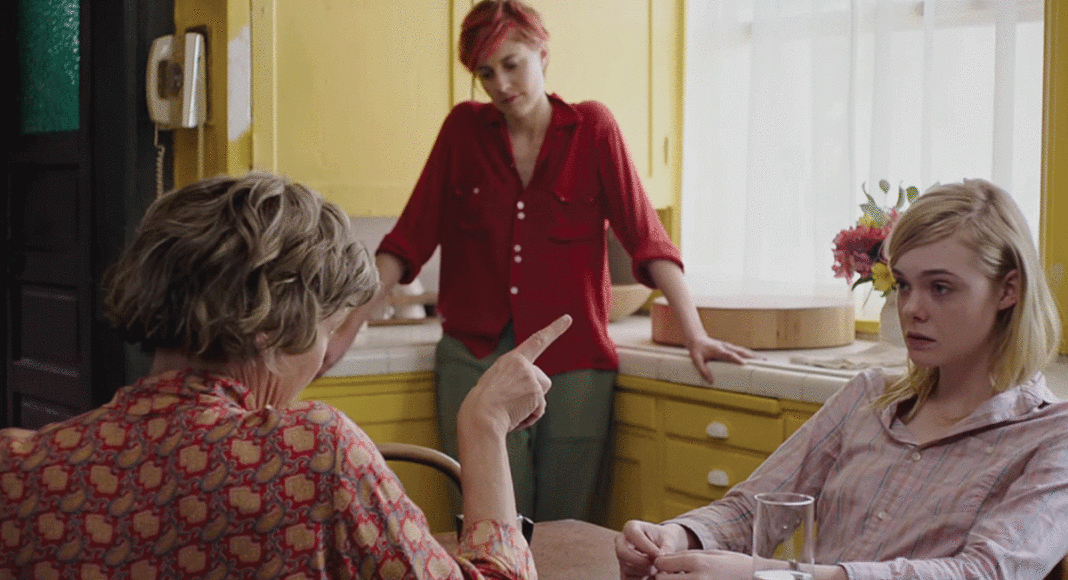It takes a village to raise a teenage boy. Or so believes the independent, middle-aged single mom protagonist of 20th Century Women, a low-key, multi-generational character study about parenting, gender, feminism, pop culture, and community set in suburban Santa Barbara in the summer of 1979. Fueled by another gutsy performance by the mighty Annette Bening, it’s the story of a woman who sets out to raise her son to be a “good man,” with a little help from her friends, and makes some discoveries about herself along the way.
The movie is written and directed by Mike Mills, whose surrogate in the story, one assumes, is the 15-year-old boy at its center, Jamie (newcomer Lucas Jade Zumann). He’s coming of age in a time of cultural upheaval, on the cusp (as one character points out) between the end of punk rock and the incoming Reagan era, while still grappling with the usual teenage preoccupations, like sex and independence.
Mills’ last film was the wonderful Beginners, in which a man in his 70s comes out to his astonished grown son. With its more ambitious, multi-layered storyline, Women doesn’t quite have the same resonance. But while it sometimes meanders without focus, the movie also achieves small moments of insight and intimacy, thanks to its excellent cast.
Jamie’s mom, Dorothea (Bening), was one of the first women to get a postwar job drafting for a design firm. She had Jamie when she was 40, and divorced his father soon after. They live in a rambling old Victorian house in a state of constant restoration overseen by Dorothea and handyman-mechanic William (Billy Crudup), who lives downstairs.
Dorothea takes in a boarder, Abbie (Greta Gerwig, in magenta-dyed hair), a local girl who went to New York City for a while to live la vie bohème, and now takes Polaroid photos of the ordinary objects in her life as an ongoing art project. She’s dealing with health issues (her doctor says she has an “incompetent cervix”) due to the fertility drugs her mother took a generation earlier.
Completing this ad hoc household is Julie (Elle Fanning), the 17-year-old neighbor Jamie has known since they were little kids. Julie secretly climbs the scaffolding eternally attached to the house to visit Jamie’s bedroom at night—but only for talk and sleep. She considers Jamie her best friend, and refuses to “ruin” their friendship with sex, although she doesn’t mind telling him about her sexual experiments with other boys. (Confessing, for instance, that she and “most of my friends” don’t have orgasms.)
Unsure how to navigate the culture of Jamie’s youth, Dorothea recruits Abbie and Julie to help steer her son toward responsible maturity. (She tries to get William to bond with him, but Jamie is profoundly uninterested in woodwork.) This plot point doesn’t lead to much, story-wise, but it provides a framework for vignettes, like Abbie (having gifted Jamie with copies of Our Bodies, Ourselves, and Sisterhood is Powerful), insisting that everyone around the dinner table say “menstruation” out loud. Or Dorothea and William test-driving albums by Talking Heads (whose songs permeate the soundtrack) and Black Flag to sample the spectrum of current music.
Bening is willing to play a somewhat haggard, yet spirited, chain-smoking woman with both wistfulness and gusto. (When she admonishes Julie that cigarettes are bad for her, and Julie points out the obvious, Dorothea says “It wasn’t bad for you then. It was stylish.”)
Mills’ most interesting storytelling device is a series of images from each character’s generation, including newsreel footage of what was going on in the world in the era they grew up in. A child of the Depression, coming of age in the ’40s, Dorothea’s signature song is “As Time Goes By,” as she copes with aging and relevance in an era “where nothing means anything.” Another strangely poignant device is having each character occasionally narrate what becomes of them in the future, after the movie’s time frame ends.
This movie, too, is like a collection of snapshots, frozen in time, as each generation struggles to understand eternal human mysteries that may only make sense as time goes by.
20th CENTURY WOMEN
*** (out of four)
Annette Bening, Greta Gerwig, Elle Fanning, Billy Crudup, and Lucas Jade Zumann. Written and directed by Mike Mills. An A24 release. Rated R. 118 minutes.













